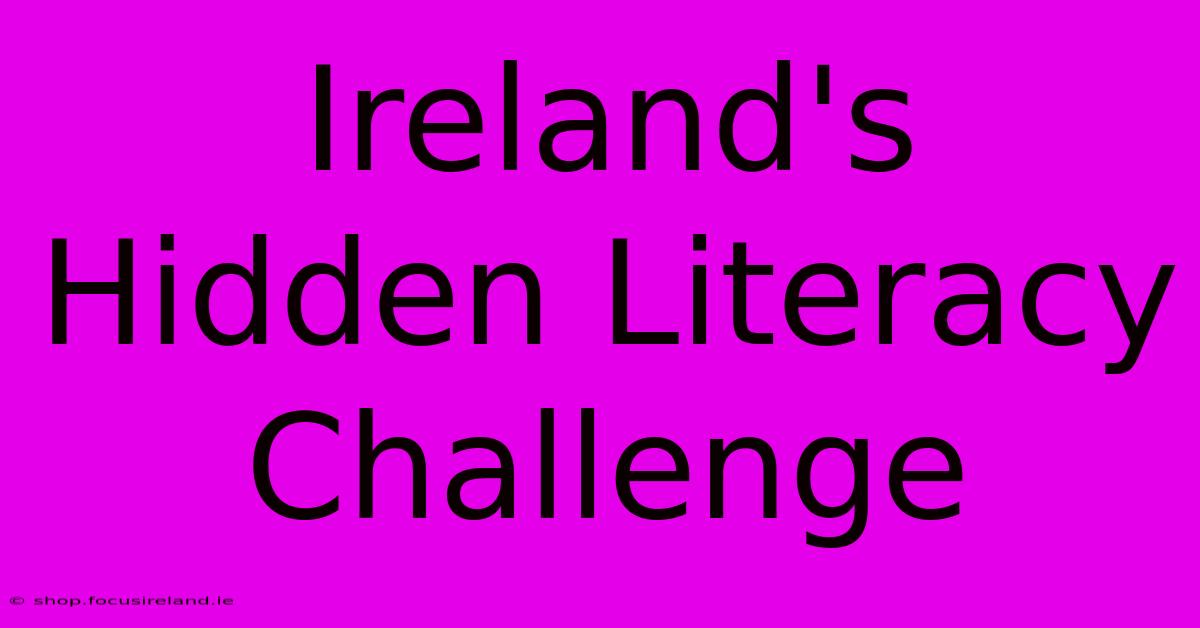Ireland's Hidden Literacy Challenge

Table of Contents
Ireland's Hidden Literacy Challenge: Unveiling the Silent Struggle
Ireland, a nation renowned for its rich literary heritage, faces a surprising challenge: a significant portion of its population struggles with literacy. This isn't the inability to read or write at all, but rather a functional illiteracy, a hidden problem impacting individuals' ability to navigate daily life and fully participate in society. This article delves into the complexities of Ireland's hidden literacy challenge, exploring its causes, consequences, and potential solutions.
The Scope of the Problem: Beyond Basic Literacy
While official statistics may not fully capture the extent of the issue, anecdotal evidence and studies suggest a concerning number of adults in Ireland possess inadequate literacy skills. This isn't about a lack of basic reading and writing skills acquired in childhood; instead, it's about a deficit in comprehension, critical thinking, and the ability to apply literacy skills in real-world contexts. This functional illiteracy affects various aspects of life, from employment and financial management to healthcare navigation and civic engagement.
The Silent Struggle of Adults:
Many adults grappling with functional illiteracy remain hidden, ashamed to admit their struggles. This silence hinders effective intervention and support. The fear of judgment or the perception of literacy as a marker of intelligence prevents many from seeking help. This stigma needs to be actively challenged through increased awareness and empathetic support systems.
Unpacking the Causes: A Multifaceted Issue
The roots of Ireland's hidden literacy challenge are complex and intertwined:
- Socioeconomic factors: Poverty, lack of educational opportunities, and unstable home environments significantly impact literacy development. Children from disadvantaged backgrounds are more likely to struggle with literacy, perpetuating the cycle into adulthood.
- Learning differences: Dyslexia and other learning disabilities can significantly affect literacy acquisition and require specialized support throughout life.
- Inadequate early childhood education: Early intervention is crucial for literacy development. A lack of access to quality early childhood education can have long-term consequences.
- Inadequate adult education provision: The availability and accessibility of adult literacy programs need significant improvement to meet the growing need. Many programs struggle with funding and attracting participants.
The Ripple Effect: Consequences Across Society
The consequences of inadequate literacy extend far beyond individual struggles:
- Economic impact: Functional illiteracy limits employment opportunities, leading to lower earning potential and increased reliance on social welfare. This creates a significant economic burden on the nation.
- Healthcare disparities: Difficulty understanding medical information and instructions can negatively impact health outcomes. Patients with poor literacy skills are less likely to adhere to treatment plans, leading to poorer health management.
- Social exclusion: Difficulties navigating bureaucratic processes, filling out forms, or accessing information can lead to social isolation and exclusion from community life.
- Reduced civic engagement: Inadequate literacy can hinder participation in democratic processes, leading to disengagement and a weaker civil society.
Toward a Solution: Investing in Literacy for a Brighter Future
Tackling Ireland's hidden literacy challenge requires a multi-pronged approach:
- Early intervention: Investing in high-quality early childhood education is crucial. This includes providing adequate resources and training for educators, particularly in identifying and supporting children with learning difficulties.
- Enhanced adult literacy programs: Expanding access to adult literacy programs is critical. These programs need to be flexible, accessible, and tailored to the specific needs of individual learners. Promoting a non-judgmental and supportive learning environment is essential.
- Raising awareness: Public awareness campaigns are crucial in reducing the stigma associated with literacy struggles and encouraging adults to seek help.
- Collaboration: Effective partnerships between government agencies, educational institutions, community organizations, and employers are essential for a coordinated and comprehensive approach.
Investing in literacy is not just about teaching people to read and write; it's about empowering them to participate fully in society, contribute to the economy, and live healthier, more fulfilling lives. Addressing Ireland's hidden literacy challenge is a critical step towards building a more equitable and prosperous future for all. Let's shed light on this silent struggle and work together to provide support and opportunities for those who need them most.

Thank you for visiting our website wich cover about Ireland's Hidden Literacy Challenge. We hope the information provided has been useful to you. Feel free to contact us if you have any questions or need further assistance. See you next time and dont miss to bookmark.
Featured Posts
-
January In Dublin Cozy Pubs And Cultural Delights
Apr 04, 2025
-
Unwind In Dingle Relaxing Air Bn Bs With Sea Views
Apr 04, 2025
-
Last Minute Ring Of Kerry B And B Deals Dont Miss Out
Apr 04, 2025
-
Is Thanksgiving Celebrated In Irelands Cities
Apr 04, 2025
-
Discover The Mystique Of Irish New Year S Eve
Apr 04, 2025
